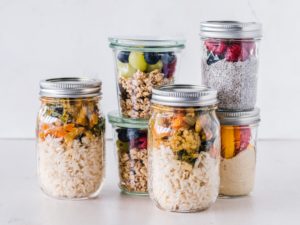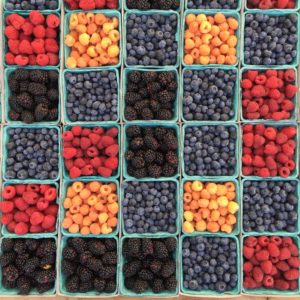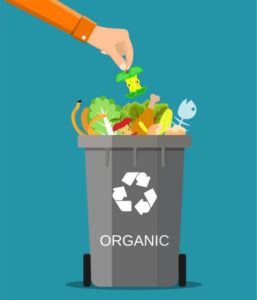Sustainability Never Tasted So Good: 9 Resolutions to Eat Greener in the New Year
 It’s resolution season again, and popular resolutions include eating better and to save money. Eating greener is a great opportunity to meet your needs, reduce environmental impact and save money.
It’s resolution season again, and popular resolutions include eating better and to save money. Eating greener is a great opportunity to meet your needs, reduce environmental impact and save money.
- Use reusable bags when shopping
 A greener diet starts at the store. Whether or not your state has done away with plastic bags, opting for reusable cotton bags is a great start to reducing waste. Currently only 1% of the trillions of plastic bags produced are recycled while hundreds of species are ingesting plastic. For some perspective, the average bag is used for 12 minutes and will not degrade for 500 years. Remembering to bring reusable bags translates into reduced oil, energy, and pollution.
A greener diet starts at the store. Whether or not your state has done away with plastic bags, opting for reusable cotton bags is a great start to reducing waste. Currently only 1% of the trillions of plastic bags produced are recycled while hundreds of species are ingesting plastic. For some perspective, the average bag is used for 12 minutes and will not degrade for 500 years. Remembering to bring reusable bags translates into reduced oil, energy, and pollution.
- Invest in reusable containers and cutlery
Single use plastics account for 40% of all plastic production and after one use will end up in a landfill or our oceans. Typical examples of single-use plastics include coffee cups, water bottles, utensils and straws. Buying more sustainable and reusable options and using them in place of single use plastics can result in a significant reduction of plastic in our landfills and oceans. While some single-use plastics may get a second life (like PET water bottles), many single use plastics (i.e. straws and hot coffee cups) are ineligible for recycling. If you’re afraid of leaving behind a reusable container, try to reuse a water bottle or cup before recycling it to extend its life.
- More meal prep at home
 Meal prepping is a great way to reduce the take out industry’s single use plastics and be more mindful about what you eat. Often times processed foods require energy, oil and packaging to produce, while also reducing the nutritional element of the food. Meal prepping once a week doesn’t have to be time consuming, as there are many simple nutritious recipes to choose from. Additionally, not only can it be healthier to cook at home instead of eating out, but it is also usually more economical. Plus you can use your reusable containers for an added benefit. Saving money, eating better and reducing waste is a triple threat for wasteful consumerism.
Meal prepping is a great way to reduce the take out industry’s single use plastics and be more mindful about what you eat. Often times processed foods require energy, oil and packaging to produce, while also reducing the nutritional element of the food. Meal prepping once a week doesn’t have to be time consuming, as there are many simple nutritious recipes to choose from. Additionally, not only can it be healthier to cook at home instead of eating out, but it is also usually more economical. Plus you can use your reusable containers for an added benefit. Saving money, eating better and reducing waste is a triple threat for wasteful consumerism.
- Buy Food In Bulk
 Buying in bulk can seem overwhelming and unnecessary, especially if you are buying for one. However, there are numerous environmental and economic benefits worth considering. Dry foods, like pasta for example, are a staple of many simple dishes and can handle being stored. The benefits here are the bulk pricing and reduced packaging material. Produce on the other hand requires a little more effort. Freezing is a great option, especially for produce to be used in smoothies. Canning (with reusable jars) is another option, if you’re feeling adventurous, to take advantage of in-season deals.
Buying in bulk can seem overwhelming and unnecessary, especially if you are buying for one. However, there are numerous environmental and economic benefits worth considering. Dry foods, like pasta for example, are a staple of many simple dishes and can handle being stored. The benefits here are the bulk pricing and reduced packaging material. Produce on the other hand requires a little more effort. Freezing is a great option, especially for produce to be used in smoothies. Canning (with reusable jars) is another option, if you’re feeling adventurous, to take advantage of in-season deals.
- Shop from local farmers markets or Fair Trade
Before you get to the market, your food has already been on its own journey with a varied carbon cost. A green diet also has to take into account production and farming practices. Buying locally at a farmers market shortens the carbon cost of your food while keeping money in your local economy. Another benefit is local produce is picked at peak ripeness while conventional produce is frequently picked pre-ripe and given ripening agents during transport. As a result, local produce tastes better. Alternatively there is the Fair Trade option, which promises that the food was produced under environmental standards and the workers were paid fair wages.
- Choose natural sweets over processed food
 The science is pretty clear when comparing processed foods with natural treats, like berries and fruits. Processed foods, especially junk foods, are usually very high in high fructose corn syrup and fat and offer little nutritional value to compensate. By opting to have fresh produce or dried fruits (a great on-the-go option), you’ll be rewarding your body with fiber and nutrients. At the end of the day, you’ll be healthier and more energized while producing less waste.
The science is pretty clear when comparing processed foods with natural treats, like berries and fruits. Processed foods, especially junk foods, are usually very high in high fructose corn syrup and fat and offer little nutritional value to compensate. By opting to have fresh produce or dried fruits (a great on-the-go option), you’ll be rewarding your body with fiber and nutrients. At the end of the day, you’ll be healthier and more energized while producing less waste.
- Grow your own
Some gardeners will joke that growing a tomato plant is a great way to save $3. In reality, however, that downplays the benefits of growing your own food. While people in the city may not have land to grow all of their food, there are numerous herbs and produce scraps. The real benefit here is the positive feedback loop and horticulture therapy of maintaining a plant that then works for you. The benefits of horticulture therapy plus homegrown food are a double win for you and the sustainability movement. Even buying prepared herbs results in single use plastic ending up at our landfills, so growing your own has the added value of reducing waste.
The real benefit here is the positive feedback loop and horticulture therapy of maintaining a plant that then works for you. The benefits of horticulture therapy plus homegrown food are a double win for you and the sustainability movement. Even buying prepared herbs results in single use plastic ending up at our landfills, so growing your own has the added value of reducing waste.
- Utilize Food Scraps
Food waste that ends up at the landfill is known to produce methane gas which is bad for the environment. Even the most conservative meal preppers may still find themselves with food scraps, for which there are a few options to explore in the name of waste reduction. As mentioned earlier, some scraps can be used to grow new produce (sometimes for numerous harvests like chives). Other scraps you can use to make a broth, a sauce or even a green cleaner (lemon peels and white vinegar). The result is maximizing the money invested in the produce and lowering your grocery bill every month.
- Compost
 Composting is a great way to dispose of food waste if you can’t use the scraps. In NYC about 21% of our trash is food waste and it would be better for the waste to become nutrient rich soil than produce greenhouse gasses in a landfill. If your municipality has organic pick-up, then you can include compostable plastics (home compost lacks the conditions to break down compostable plastics). By composting waste, urban farmers and gardeners will have better soil to work with while reducing sanitation costs.
Composting is a great way to dispose of food waste if you can’t use the scraps. In NYC about 21% of our trash is food waste and it would be better for the waste to become nutrient rich soil than produce greenhouse gasses in a landfill. If your municipality has organic pick-up, then you can include compostable plastics (home compost lacks the conditions to break down compostable plastics). By composting waste, urban farmers and gardeners will have better soil to work with while reducing sanitation costs.




